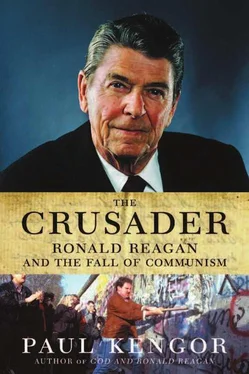13. One of the better testimonies to how Gorbachev neither planned nor desired the upheaval in Eastern Europe was a December 1992 review essay by Michael Cox in the scholarly journal Soviet Studies. Michael Cox, “Beyond the Cold War in Europe: A Review Article,” Soviet Studies, 44, no. 6 (December 1992): 1099–1103.
14. Brown, The Gorbachev Factor, 268.
15. In his superb work published by Yale University Press, William E. Odom cautiously discusses the situation in December 1991 in which Gorbachev summoned Marshal Yevgenny Shaposhnikov to the Kremlin and, according to Shaposhnikov, raised the prospect of using the military to preserve Gorbachev’s hold on power. As Odom notes, this account can only be confirmed by Gorbachev, “who is hardly going to do so.” William E. Odom, The Collapse of the Soviet Military (New Haven and London: Yale University Press, 1998), 352–54.
16. Matlock, Reagan and Gorbachev, 302.
17. Ibid., 304–6.
18. The headline read: “Soviet Leaders Agree to Surrender Communist Party Monopoly on Power.” The accompanying news article was by Francis X. Clines.
19. Jack Matlock agrees with me on these points. See Matlock, Reagan and Gorbachev, 317–18.
20. Brown, The Gorbachev Factor, 105–6, 193–94.
21. Ibid., 96.
22. Reagan, “Address to the Cambridge Union Society,” Cambridge, England, December
5, 1990, in Ryan, ed., Ronald Reagan: The Wisdom and Humor of the Great Communicator. 23. This is shown nicely, but not intentionally, in an excellent, detailed chronology of Soviet events listed in the index of Jack Matlock’s Autopsy of an Empire, 749–59. 24. Valery Boldin, Ten Years That Shook the World (New York: Basic Books, 1994), 336. Ambassador Jack Matlock, a keen observer as close to the scene as anyone, put it well when he summarized: “When he came to power, Gorbachev still believed in the Soviet system….He was convinced that the instrument to achieve… changes would be the Communist Party itself….Gorbachev’s policies eventually…destroy[ed] the system they were intended to save.” Matlock, Reagan and Gorbachev, 110.
25. Reed, At the Abyss, 225.
26. Gorbachev gave this speech on December 25, 1991.
27. Princeton University, Woodrow Wilson School of Public and International Affairs, “Retrospective on the End of the Cold War,” A Conference Sponsored by the John Foster Dulles Program for the Study of Leadership in International Affairs, Princeton, NJ, February
25–27, 1993; and Bruce Olson, “SDI, Chernobyl Said to Break Cycle of Nuclear Build up,” Executive News Service, February 26, 1993. His remarks are also in Wohlforth, ed., Witnesses to the End of the Cold War, 31–32.
28. Interview with Alexander Donskiy, October 2, 2000. Donskiy now travels with the Kiev symphony.
29. Lukhim quoted by Robert McFarlane in his memoir, Special Trust (New York: Cadell & Davies, 1994), 235.
30. Trofimenko in Hofstra conference (1993) proceedings, 136–37.
31. Ibid., 138–40. The Economist of London agreed: “He [Reagan] said that he would spend the Soviet Union into submission; he did.” The Economist, June 5, 1993. 32. Trofimenko in Hofstra conference (1993) proceedings, 134–45, particularly 138. 33. Trofimenko stated: “[T]he greatest flimflam man of all time, Mikhail Gorbachev, was made the Nobel Peace Prize laureate.” Trofimenko in Hofstra conference (1993) proceedings,
138–45; and Andrew E. Busch, “Ronald Reagan and the Defeat of the Soviet Empire,” Presidential Studies Quarterly, Summer 1997, 455–62.
34. A surprising source of agreement is Strobe Talbott, Time magazine’s chief Reagan critic and later the Clinton administration’s top man on Russia. Talbott conceded that SDI had “given the Soviets an incentive to return to the bargaining table and offer serious proposals in the hope of tightening the bonds of arms control around SDI itself.” He agreed that after the Soviets had walked out of arms control talks in 1984, “SDI was a factor in luring them back to the bargaining table.” “For that Reagan deserves credit,” conceded Talbott. “SDI helped elicit from the Soviets a dizzying barrage of proposals.” Strobe Talbott, “Grand Compromise: SDI could end the arms-control stalemate,” Time, June 23, 1986, 22, 25.
35. Morris in Wilson, ed., Power and the Presidency, 131.
36. Cannon testimony at University of Virginia’s Miller Center in Thompson, ed., Leadership in the Reagan Presidency, Pt II: Eleven Intimate Perspectives, 61–62.
37. Shultz, Turmoil and Triumph, 264, 690, 699, 709.
38. Interview with Edward Teller, July 15, 2003.
39. Thatcher said that SDI proved “central to the West’s victory in the Cold War.” “Looking back,” she said, “it is now clear to me that Ronald Reagan’s original decision on SDI was the single most important of his presidency.” Thatcher, Downing Street Years, 463.
40. Gaddis, The United States and the End of the Cold War, 130–31; and Gaddis, “Hanging Tough Paid Off,” 11–14.
41. Garthoff’s exact words were that the Reagan military buildup and SDI “posed a military challenge that the Soviet Union was economically and technologically hard pressed to meet….Gorbachev understood that the Soviet Union could not afford to match or overmatch the United States militarily.” Garthoff maintains that Gorbachev understood that he did not need to try to match or overmatch the United States. Gorbachev, he argues, consequently felt that the world would be better off without military competition: “He did not lose the arms race, he called it off.” Garthoff, The Great Transition, 775.
42. Ibid., 614, 605–6, 635, 720. See Reagan, “The President’s News Conference,” December 8, 1988; and “Remarks Following the Soviet-United States Summit Meeting in Moscow,” June 2, 1988.
43. Reagan, “The President’s News Conference,” December 4, 1985; and “Remarks and a Question-and-Answer Session With Broadcast Journalists on the Meetings in Iceland With Soviet General Secretary Gorbachev,” October 14, 1986.
44. Ronald Reagan, An American Life, 508., 508. 8890639.
46. Gorbachev, Memoirs, 457. He has made identical or near identical remarks in Gorbachev speaking on “Reagan,” The American Experience, PBS; and Gorbachev, July 1997 statement, in A Shining City: The Legacy of Ronald Reagan (New York: Simon and Schuster, 1998), 222.
47. Gorbachev speaking on “Reagan,” The American Experience, PBS.
48. “Ron and Gorby Remember the Good Old Days,” Reuters, September 18, 1990.
49. Jack Matlock, who attended the dinner, relays the exchange in Reagan and Gorbachev, 326.
50. Gorbachev speaking on “Ronald Reagan: A Legacy Remembered,” History Channel productions, 2002.
6. Thomas Mann, director of the Governmental Studies program at the Brookings Institution, agrees that a “success of the Reagan administration was the process of democratization—the march toward free governments around the world.” Thomas Mann in Berman, ed., Looking Back on the Reagan Presidency, 26. Professor Robert A. Pastor, a Latin America expert at Emory University and the Carter Center, who is stingy in his praise of Reagan administration policy, concedes that, “the 1980s saw an unprecedented wave of democratization in Latin America” in particular. Robert A. Pastor in Berman, ed., Looking Back on the Reagan Presidency, 33.
7. Gorbachev letter was posted at the Web site of the Reagan Library and Museum. 8. Vladimir Isachenkov and Jim Heintz, “Reagan Mourned in Former ‘Evil Empire,’” Moscow Times, June 7, 2004.
9. David E. Hoffman, “Hastening an End to the Cold War,” Washington Post, June 6, 2004. 10. Russert interviewed by Chris Jansing, MSNBC, June 6, 2004.
11. Ted Anthony, “U.S. and the World Mourn Reagan’s Death,” Associated Press, June
Читать дальше












